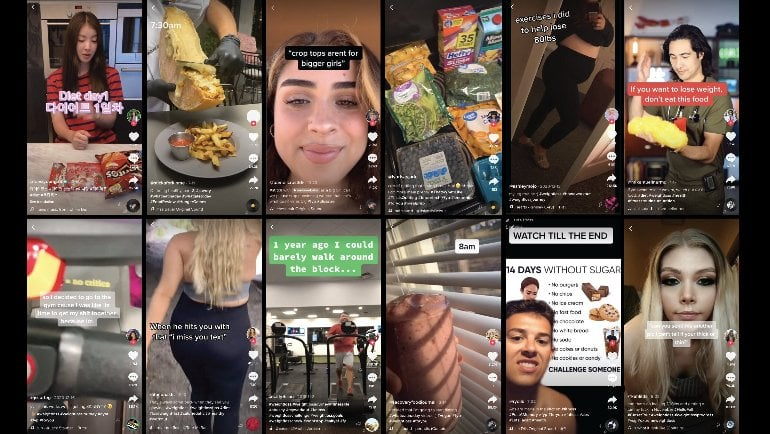Based on a University of Vermont research reported Tuesday in the journal PLOS One, wellness and dieting patterns on TikTok promote weight reduction and disordered eating patterns and body image dissatisfaction, specifically among teenage and young users.
This is the first research to evaluate nutritional and body image material on a scale on the social app featuring short clips. Many of the videos shared on the social app undeniably highlight the basic concepts of body normativity and may reaffirm to audiences the perception that weight is a significant measure of one's health status and general self-worth.
The numerous weight reduction trends ignore lifestyle elements that influence weight and health, leaving audiences with the notion that weight loss, as well as thinness, are feasible and attractive to everybody, potentially leading to harmful beliefs and behaviors related to food, weight, and body image. The films were then categorized based on important themes such as the celebration of weight reduction, the placement of food to attain health and thinness, and the lack of professional voices offering nutrition knowledge.
The Popularity of TikTok Among Youth
TikTok is a popular site for social media among children and young people. TikTok is popular for food, diet, and weight-related posts, however, there is scant awareness of the substance of such posts and if dietary material is offered by professionals. The goal was to uncover the main themes in TikTok food, nutrition, especially weight-related posts. 1000 TikTok videos with over 1 billion views from 10 prominent health, and food, including weight-related hashtags were retrieved and evaluated using template analysis. The top one hundred videos for each of the 10 hashtags were downloaded. The videos were then coded for major topics by two programmers, as defined by New Medical.Net.
Every day, millions of adolescents and young adults can get information on TikTok that creates an idealistic and misleading picture of food, nutrition, and health, as per senior scientist Lizzy Pope, associate professor and head of the Didactic Program in Dietetics at UVM.
Getting trapped in weight management TikTok may be a very difficult environment, particularly for the platform's primary users, who are young people.
The analysis is the first to look at nutrition and body-image material on TikTok at scale. The results are based on a thorough examination of the 100 best videos from ten prominent nutrition, food, and weight-related topics, which were then categorized as important topics.
Axios reported that the research was conducted in 2020, and each of the ten hashtags received over a billion views; the chosen hashtags have risen dramatically as TikTok's number of users has grown. The scientists were always taken aback by how pervasive the issue of weight had been on TikTok. The fact that billions of people were seeing weight-related information on the internet speaks a lot about the role diet culture plays in our society, as noted by co-author Marisa Minadeo, who conducted the research after her UVM undergraduate thesis.

Video Samples of TikTok health related contents. A study reveals that the social media giant platform TikTok misleads young folks when it comes to nutrition.
The Influence of Social Media on Nutrition
The Nutrition and Food Sciences Department at UVM has transitioned away from a body composition perspective in recent years, embracing a weight-inclusive approach to dietetics education.
The method focuses on evaluating a person's health through non-weight indicators of health as well as well-being rather than the notion that there is some "normal" weight that is feasible or possible for everyone. According to Pope, if society will continue to foster weight normativity, we are promoting fat bigotry.
Everyone has varied weights, just as people have different heights, Pope explained, and the only reasonable way to view mankind is through the lens of weight-inclusive nourishment. Weight-inclusive nutrition is gaining popularity as a more comprehensive approach to assessing a person's health. Since Netizens, UVM health studies society major Minadeo along with her adviser Pope were curious about TikTok's significance as a source of nutrition and good eating practices.
Researchers were astonished to see that TikTok creators regarded as academic nutrition influencers were not creating a significant impact on the entire environment of nutrition content. The bulk of the content creators studied in the study were white, female teens and young adults. The researchers characterized expert voices as those who self-identified as licensed dieticians, doctors, or qualified trainers.
But what people need is a dramatic shift in their attitudes toward their bodies, food, and health. It genuinely is about improving the systems that surround everyone so that individuals may live productive, happy, and healthy lives.
RELATED ARTICLE: Tiktok Brain Explained: Endless Dopamine Rush From Short Videos Get Kids Hooked
Check out more news and information on TikTok and Mental Health in Science.














